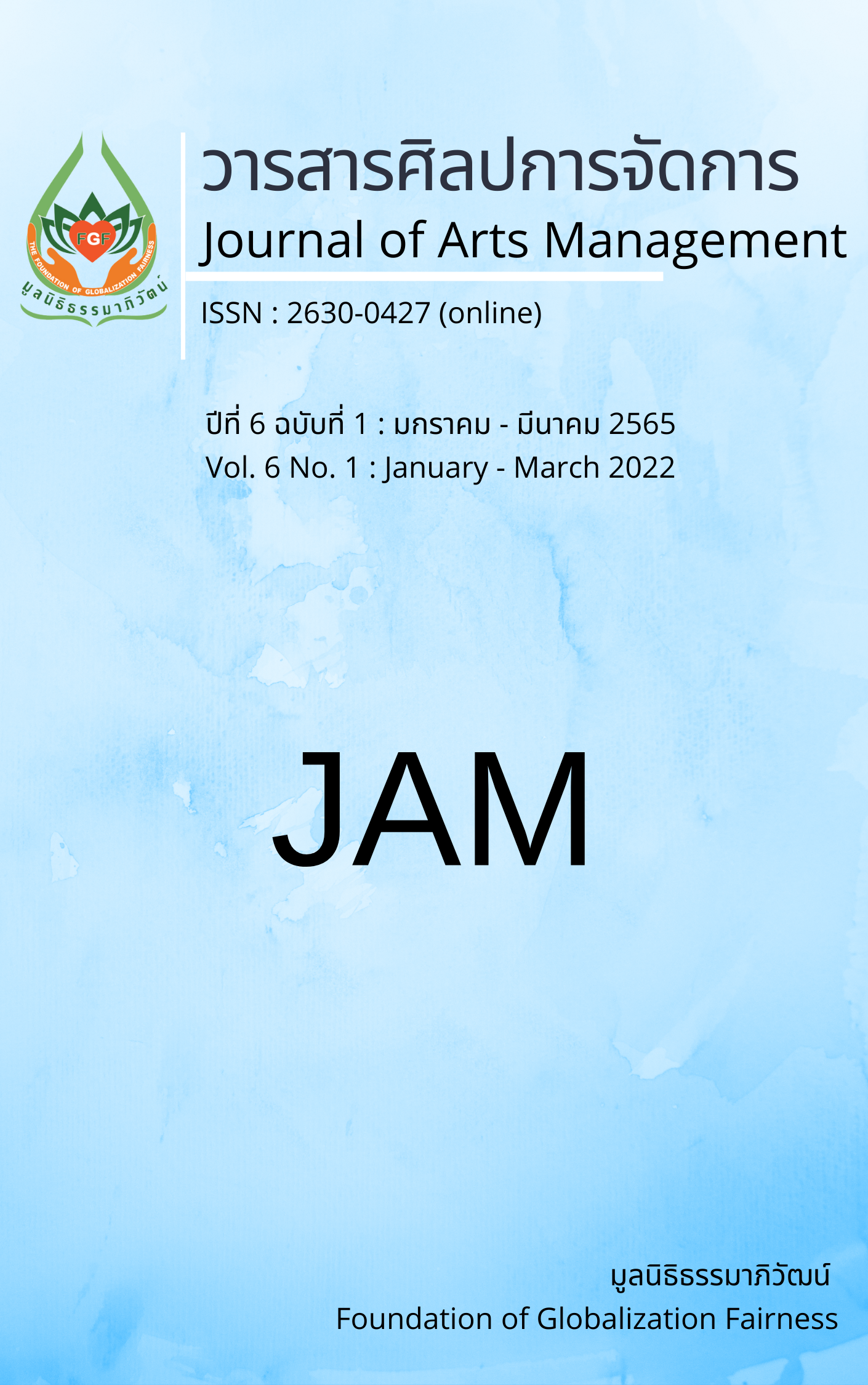Causal Factors of Technology Trust in Online Social Network Affecting the Decision Behavior to Buy Tours Online from Tour Operators
Main Article Content
Abstract
This article aimed to study 1) the causal factors affecting technology trust in social networks of tour operators; 2) the influence of causal factors of technology trust in online social networks on the decision behavior to buy tours online from tour operators; and 3) construct a model of the causal factors of technology trust in online social networks affecting the decision behavior to buy tours online from tour operators. The tools used for data collection were selected from interview forms and online questionnaires. The instruments for collecting data were descriptive statistics and inferential statistics. Analysis data was made by means of descriptive statistics and content analysis. The research results were found as follows: online marketing affects technology trust; online marketing affects online tour decision making behavior; technology acceptance affects technology trust; technology acceptance affects online tour decision making behavior; experience affects technology trust; experience affects online tour decision making behavior; and technology trust affects online tour decision making behavior. Therefore, tour operators can use the results of research to develop online marketing strategies, technology acceptance, and experience to create a competitive advantage for their business.
Article Details

This work is licensed under a Creative Commons Attribution-NonCommercial-NoDerivatives 4.0 International License.
Views and opinions appearing in articles in the Journal of Arts of Management It is the responsibility of the author of the article. and does not constitute the view and responsibility of the editorial team I agree that the article is copyright of the Arts and Management Journal.
References
Bhalerao, D. (2014). Study of current marketing behavior practices for application of marketing behavior matrix in online marketing. International Journal of Research in Management, 4(1), 54-65.
Cheng, C. L. (2020). The effect of time pressure on experience decision incorporating conflicting descriptions. Advances in Psychology, 10(9), 1363-1374.
Department of Tourism. (2020). Database of tourism business operators. Department of Tourism. https://www.dot.go.th
Doleck, T., Bazelais, P., & Lemay, D. J. (2018). The role of behavioral expectation in technology acceptance: A CEGEP case study. Journal of Computing in Higher Education, 30, 407-425.
Fang, H. (2009). Decision factors for the adoption of e-finance and other e-commerce activities[Doctoral dissertation, Southern Illinois University Carbondale].
Goundar, S., Lal, K., Chand, A., & Vyas, P. (2021). Consumer perception of electronic commerce-incorporating trust and risk with the technology acceptance model. In Tech Open.
Harris, M., & Rogers, W., (2020). Integrating technology acceptance and behavior change theories to guide technology interventions. Innovation in Aging, 4(S1), 555. https://doi.org/10.1093/geroni/igaa057.1823
Hartwich, F., Hollander, C., Johannmeyer, D., & Krems, J. F. (2021). Improving passenger experience and trust in automated vehicles through user-adaptive HMIs: The more the better does not apply to everyone. Frontiers Human Dynamic, 3, 669030. https://doi.10.3389/fhumd.2021.669030
Indriastuti, D., & Hidayat, A. (2021). The importance of service experience, trust, and satisfaction on banking customer loyalty. European Journal of Business and Management Research, 6(3), 92-98. https://doi.org/10.24018/ejbmr.2021.6.3.864
Kariapper, R. (2021). Application of technology acceptance model (TAM) in consumer behavioral intention towards online shopping. Systematic Reviews in Pharmacy, 12(3), 322-332.
Kaur, P., Ruohomaa, S., & Kutvonen, L. (2012). Enabling user involvement in trust decision-making for inter-enterprise collaborations. International Journal on Advances in Intelligent Systems, 5(3-4), 533-552.
Kudryavtsev, A., & Pavllodsky, J. (2012). Description-based and experience-based decisions: Individual analysis. Judgment and Decision Making, 7(3), 316–331.
Liao, S. H., & Chiu, W. L. (2021). Investigating the behaviors of mobile games and online streaming users for online marketing recommendations. International Journal of Online Marketing, 11(1), 39-61.
Lin, G., Miao, Y., & Liu, S. (2018). Decision-behavior-based online shopping. In Proceedings of the 15th International Conference on Control, Automation, Robotics, and Vision (ICARCV), 18-21 November 2018, Singapore.
Liu, J-M., Li, H-L., & Zhang, W-X. (2016). The description-experience gap in behavioral decision making: Interpretation of information processing. Advances in Psychological Science, 24(10), 1623-1635.
Lozhachevska, O., Navrotska, T., Melnyk, O., Kapinus, L., Zos-Kior, M., and Hnatenko, I. (2021). Management of logistics and marketing behavior of innovation clusters in territorial communities in the context of digitalization of society and the online market. Laplage em Revista (International), 7(3), 315-323.
Lu, J., Yu, C., Liu, C., & Yao, J. E. (2003). Technology acceptance model for wireless Internet. Internet Research, 13(3), 206-222. https://doi.org/10.1108/10662240310478222
Pappas, N. (2016). Marketing Strategies, Perceived Risks, and Consumer Trust in Online Buying Behaviour. Journal of Retailing and Consumer Services, 29, 92-103. DOI: 10.1016/j.jretconser.2015.11.007
Santosh, K.C., & Mukherjee, A. (2017, April 10). Characterizing product lifecycle in online marketing: Sales, trust, revenue, and competition modeling. Cornell University. https://arxiv.org/abs/1704.02993v1
Selker, T., Fischer, E.A., Bederson, B., & McCormack, C. (2003). Voting: User experience, technology and practice. In Proceedings of the Conference on Human Factors in Computing Systems, 5-10 April 2003, Lauderdale, Florida, USA.
Shrestha, A. K., Vassileva, J., Joshi, S., & Just, J. S. (2021). Augmenting the technology acceptance model with trust model for the initial adoption of a blockchain-based system. Peer Journal Computer Science, 7, e502. https://doi.org/10.7717/peerj-cs.502
Towhidi, G., Sinha, A.P., Srite, M., & Zhao, H. (2020). Trust decision-making in online social communities: A network-based model. Journal of Computer Information Systems, 62(1), 153-163. https://doi.org/10.1080/08874417.2020.1744200
Werff, L., Legood, A., Buckley, F., Weibel, A., & Cremer, D. (2019). Trust motivation: The self-regulatory processes underlying trust decisions. Organizational Psychology Review, 9(2-3), 99-123. https://doi.org/10.1177/2041386619873616
Zou, W., Wang, J., & Yan, J. (2020). Online markets and trust. SSRN. http://dx.doi.org/10.2139/ssrn.3729264


